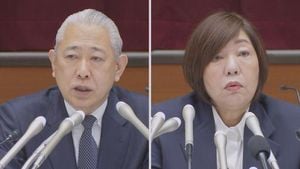In a lively episode of the talk show "Markus Lanz" aired on May 7, 2025, the co-chair of the Green Party, Franziska Brantner, found herself in a challenging position while discussing the coalition's controversial debt plans. The conversation took a turn when Brantner stumbled over the figures she initially cited, leading to a moment of confusion that quickly became the highlight of the show.
Brantner, who previously served as the Secretary of State for Economic Affairs, attempted to explain the infrastructure fund proposed by the Ampel coalition, which was led by her former boss, Robert Habeck. She stated, "We had an infrastructure fund for our land foreseen of 300,000." However, this figure was quickly corrected by host Markus Lanz, who pointed out that the actual amount was "300 million!" Brantner appeared surprised and corrected herself, saying, "Uh, 300 million. Excuse me!" The confusion escalated as Lanz continued to adjust the figures, eventually stating, "And now we’re at billions!" to which Brantner could only respond, "Billions! These are sums that are large, which we are talking about..."
The discussion not only highlighted Brantner's slip-up but also underscored the tensions within the political landscape, particularly regarding the financial plans of the current government. The episode also featured Martin Huber, the Secretary General of the Christian Social Union (CSU), who engaged in a spirited exchange with Brantner. Huber, while acknowledging that he did not suspect the Greens of having bad intentions, criticized their direction, stating, "I do not attribute bad intentions to the Greens, but I do attribute a wrong course to them."
Brantner, visibly frustrated by Huber's earlier remarks that labeled the Green Party's agenda as "outdated" and "junk," demanded more humility and mutual recognition among political parties. She expressed her disappointment regarding the negative portrayal of her party, saying, "You have demonized us for weeks, months, saying we are the absolute worst, the very worst. Now that you want to govern, we have already helped you twice." This statement referred to the coalition's efforts to facilitate a second ballot for Friedrich Merz, the newly elected Chancellor from the CDU, after a contentious first round of elections.
Reflecting on the recent election, Brantner admitted to being "shocked" by the results, particularly since she had anticipated that Merz would secure a majority. She remarked, "I personally bet that he would get a majority." This sentiment was echoed by political analyst Wulf Schmiese, who reported on the atmosphere in the Bundestag during the election process, indicating ongoing debates and discussions about the implications of the election.
Meanwhile, Huber took the opportunity to criticize the handling of the hydrogen infrastructure expansion under former Minister Habeck, asserting that Bavaria had been systematically disadvantaged. He claimed, "The planning of the Ampel coalition has proceeded from north to south, which means Bavaria would only be addressed late in the process." Huber's comments were not just limited to infrastructure; he also criticized the government's response to the 2024 flooding disaster in Bavaria, pointing out that despite Habeck's declaration of a "national catastrophe," funding had yet to be distributed.
In contrast, Katherina Reiche, the new Minister of Economic Affairs, praised Habeck's performance during his tenure, especially in the wake of the energy crisis following the Russian invasion of Ukraine. Reiche described Habeck's efforts as a "nearly superhuman achievement" and expressed her respect for his work.
As the conversation shifted back to energy policy, Brantner emphasized the importance of maintaining Germany's competitive edge in hydrogen technology, stating, "If we can manage to keep this market for ourselves and not revert to gas, then we not only have a cleaner, better energy source but also jobs for the future." This statement reflects the ongoing debate among political parties regarding the path to climate neutrality and the differing strategies proposed by the Union and SPD.
During the discussion, Huber acknowledged the significance of hydrogen as a topic but insisted that Germany also required reliable power generation, which necessitated gas power plants. He expressed concern over the Bundesnetzagentur's proposal to incentivize companies that align their production with the availability of wind and solar energy, arguing that it would disadvantage others. "I believe we cannot make the largest economy in Europe dependent on the weather report," he remarked.
The episode of "Markus Lanz" not only served as a platform for political discussion but also illustrated the complexities and challenges facing the current coalition government. As Brantner and Huber exchanged barbs, it became clear that the road ahead would require cooperation and acknowledgment of each party's contributions and challenges.
As the political landscape continues to evolve, the implications of these discussions will resonate in the coming months, particularly as the government grapples with pressing issues such as climate policy, economic recovery, and the ongoing impact of recent elections.




